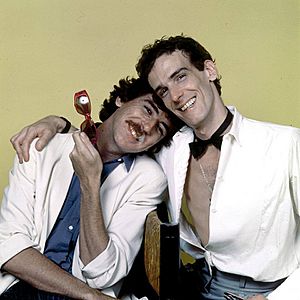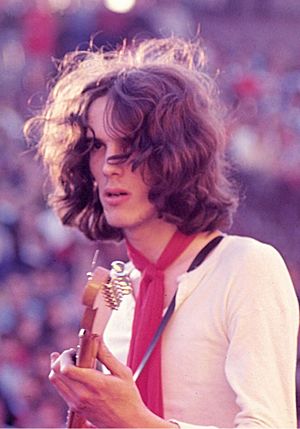Luis Alberto Spinetta facts for kids
Quick facts for kids
Luis Alberto Spinetta
|
|
|---|---|

Spinetta in 1976
|
|
| Born | 23 January 1950 Buenos Aires, Argentina
|
| Died | 8 February 2012 (aged 62) Buenos Aires, Argentina
|
| Resting place | Ashes scattered in the Río de la Plata, facing the Remembrance park |
| Occupation |
|
| Years active | 1967–2012 |
| Height | 184 cm (6 ft 0 in) |
| Spouse(s) |
Patricia Salazar
(m. 1976; div. 1995) |
| Children | 4, including Dante |
| Musical career | |
| Genres | |
| Instruments |
|
| Labels |
|
| Associated acts |
|
| Signature | |
Luis Alberto Spinetta (born January 23, 1950 – died February 8, 2012) was a famous Argentine singer, guitarist, composer, and poet. People often called him "El Flaco", which means "the skinny one" in Spanish. He was one of the most important rock musicians in Argentina. Many consider him a founder of Argentine rock, which was the first type of Spanish-language rock.
Spinetta was born in Buenos Aires, Argentina. He started several well-known rock bands. These included Almendra, Pescado Rabioso, Invisible, Spinetta Jade, and Spinetta y Los Socios del Desierto. In Argentina, January 23rd is now "National Musician's Day". This day celebrates Spinetta's birthday and his impact on music.
Spinetta focused completely on making his own music. His song lyrics were inspired by many writers, poets, and artists. Some of these influences included Arthur Rimbaud, Vincent van Gogh, and Carl Jung. His album Artaud was even named after the artist Antonin Artaud.
In December 2011, he shared that he had lung cancer. Luis Alberto Spinetta passed away on February 8, 2012, when he was 62 years old. His ashes were scattered in the Río de la Plata river in Buenos Aires, as he wished.
Contents
The Musical Journey of Luis Alberto Spinetta
Early Bands: Almendra, Pescado Rabioso, Invisible
In the late 1960s, Buenos Aires was a lively place for new art and music. This was happening even though Argentina had a strict government at the time. Young people were creating new things, and this energy would not return until Argentina became a democracy again in 1983.
In 1969, Spinetta's band, Almendra, released their first album. It was called Almendra. They quickly became very popular. Almendra wrote their own songs with lyrics in Spanish. This was quite new for Argentine rock music back then. After two successful albums, the band decided to break up.
After traveling in Europe, Spinetta came back to Argentina. He then formed a new band called Pescado Rabioso. This band had a much stronger sound. Their songs showed the feelings of a changing Argentina. Pescado Rabioso released their first album in 1972. It continued Spinetta's creative style but also changed his music and lyrics a lot. The band made a second album too. A third album, Artaud, came out in 1973. Even though it had the band's name, Pescado Rabioso had already split up. So, Artaud was mostly a solo album by Spinetta. This album opened the door for a new period in his music.
In 1974, he started another band, Invisible. Their music was heavy, with elements of prog rock and psychedelia. With Invisible, he recorded three albums: Invisible, Durazno Sangrando, and El jardín de los presentes. The last album had softer, more beautiful tunes. It showed a delicate side to the band's powerful sound.
In 1979, Spinetta tried to record an album in the United States with English lyrics. It was meant for the American market but was not successful. He then returned to Argentina. He recorded two more albums with a short-lived reunion of Almendra. One album had new songs, and the other was recorded live. After this, he began a new project called Spinetta Jade.
New Sounds: Spinetta Jade and Solo Career

Spinetta Jade became a very successful and creative band. Spinetta worked with other great Argentine musicians to create a new sound. This sound mixed jazz and rock, which was different from the popular symphonic rock of the 1970s. It also stood out from the new wave and punk music that became popular in the 1980s. Spinetta Jade released four albums: Alma de Diamante (1980), Los Niños que Escriben en el Cielo (1981), Bajo Belgrano (1983), and Madre en Años Luz (1984). These albums show how Spinetta's music grew and changed.
Spinetta and Charly García, another famous Argentine musician, also worked together. Their bands, Spinetta Jade and Serú Giran, performed some of the most important shows in Argentine rock history. After Spinetta Jade broke up in 1984, Spinetta and Charly tried to make an album together. However, they stopped working on it. Only two songs from this project remain: "Rezo por Vos" and "Total Interferencia".
By 1982, Spinetta had started his solo music projects again. He continued making solo music from then on. His album Kamikaze (1982) included songs he had not released before. One special song was "Barro Tal Vez," which he wrote way back in 1965. His solo work continued with albums like Mondo Di Cromo (1983), Privé (1986), Téster de Violencia (1988), Don Lucero (1989), and Pelusón of Milk (1991). He also made a joint album, La La La (1986), with Fito Páez. In 1993, he created the soundtrack for the movie Fuego Gris.
After a break, partly due to some challenges with music companies, Spinetta began a new phase with his band: Spinetta y los Socios del Desierto. Between 1997 and 1999, the band released four albums. These included two studio albums, Socios del Desierto (1997) and Los Ojos (1999), which brought a fresh sound. They also released a live MTV Unplugged album called Estrelicia (1998), which was acoustic. This was very different from their other live album, San Cristóforo (1998). Spinetta even joked at a concert, "Fans of acoustic music, refrain!" In 1998, he helped choose the songs for a greatest hits album called Elija y Gane.
The band quietly ended around 1999. Spinetta then focused on his solo career again. He released albums like Silver Sorgo (2001), Para Los Árboles (2003), Camalotus (2004), Pan (2006), and Un Mañana (2008). In 2005, he won a special award, the Platinum Konex Award, for being the best rock soloist from 1995 to 2005. Many books and TV shows have been made about him.
In 2009, Spinetta celebrated 40 years in music with a huge concert. It was called "Spinetta y las Bandas Eternas" (Spinetta and The Eternal Bands). Forty thousand fans watched him perform for five and a half hours at Vélez Sarsfield Stadium in Buenos Aires. Music critics later called it "the greatest gig of the decade."
Remembering Luis Alberto Spinetta
Luis Alberto Spinetta passed away from lung cancer on February 8, 2012. He was 62 years old.
Spinetta's Family Life
Spinetta had four children. They are Dante (born 1976), Catarina (born 1979), Valentino (born 1983), and Vera (born 1991).
Honoring a Music Legend
On January 23, 2020, Google honored Spinetta on what would have been his 70th birthday. They created a special Google Doodle for him.
Luis Alberto Spinetta's Music Albums
Almendra Albums
Studio albums
- Almendra (1969)
- Almendra II (1970)
- El Valle Interior (1980)
Live albums
- Almendra en Obras I/II (1980)
Pescado Rabioso Albums
- Desatormentándonos (1972)
- Pescado 2 (1973)
- Artaud (1973)
Invisible Albums
Studio albums
- Invisible (1974)
- Durazno Sangrando (1975)
- El jardín de los presentes (1976)
Non-album singles
- "Estado de coma" (1974)
- "La llave del Mandala" (1974)
- "Viejos ratones del tiempo" (1974)
Live albums
- En Vivo Teatro Coliseo 1975 (2022)
Spinetta Jade Albums
- Alma de Diamante (1980)
- Los Niños Que Escriben En El Cielo (1981)
- Bajo Belgrano (1983)
- Madre en Años Luz (1984)
Spinetta y los Socios del Desierto Albums
Studio albums
- Socios del Desierto (1996)
- Los Ojos (1999)
Live albums
- San Cristóforo (1998)
Solo Albums
Studio albums
- Spinettalandia y Sus Amigos - La Búsqueda de la Estrella (1971)
- Artaud (1973, edited as an album of Pescado Rabioso)
- A 18´ del Sol (1977)
- Only Love Can Sustain (1980) (Solo el Amor Puede Sostener)
- Kamikaze (1982)
- Mondo Di Cromo (1982)
- Privé (1986)
- La La La (1986, con Fito Páez)
- Téster de Violencia (1988)
- Don Lucero (1989)
- Pelusón of Milk (1991)
- Fuego Gris (1993, soundtrack)
- Silver Sorgo (2001)
- Para los Árboles (2003)
- Camalotus (2004)
- Pan (2006)
- Un Mañana (2008)
- Los Amigo (2015, posthumous)
Live albums
- Exactas (1990, live)
- Estrelicia (1997, MTV Unplugged)
- San Cristóforo: Un Sauna de Lava Eléctrico (1998, live)
- Argentina Sorgo Films Presenta: Spinetta Obras (2002, live)
- Spinetta y las Bandas Eternas (2010, live)
- Presentación ARTAUD - 1973 - Teatro Astral (2020, official bootleg)
- Presentación ARTAUD - 1973 - Teatro Astral Vol. 2 (2021, official bootleg)
Compilations
- Elija y Gane (1999, greatest hits)
- Ya no mires atrás (2020, unreleased material) (recorded 2008-09)
Poetry
- 1978: Guitarra negra (English: "Black Guitar"). Buenos Aires: Ediciones Tres Tiempos.
See also
 In Spanish: Luis Alberto Spinetta para niños
In Spanish: Luis Alberto Spinetta para niños
 | Jessica Watkins |
 | Robert Henry Lawrence Jr. |
 | Mae Jemison |
 | Sian Proctor |
 | Guion Bluford |


